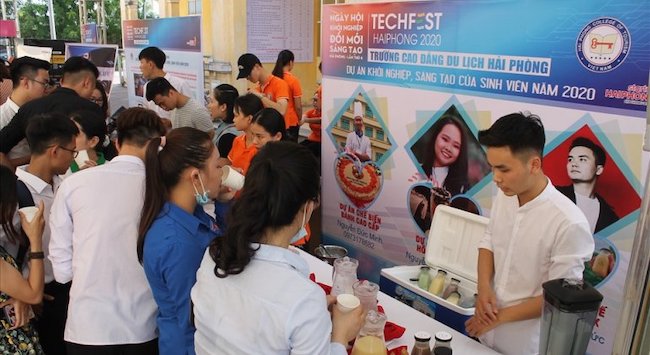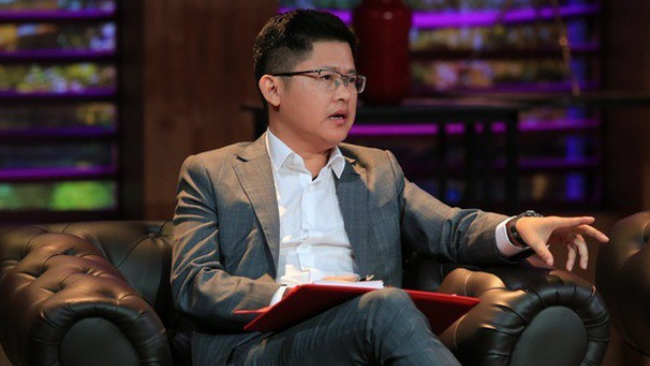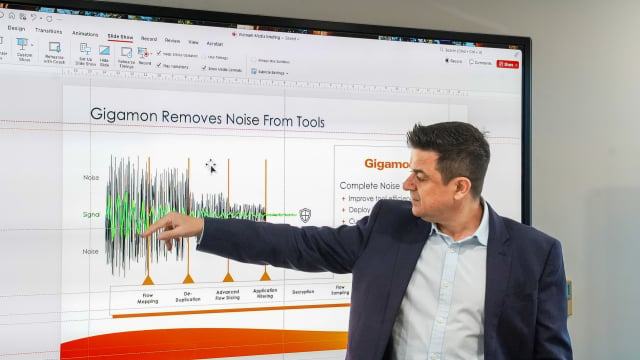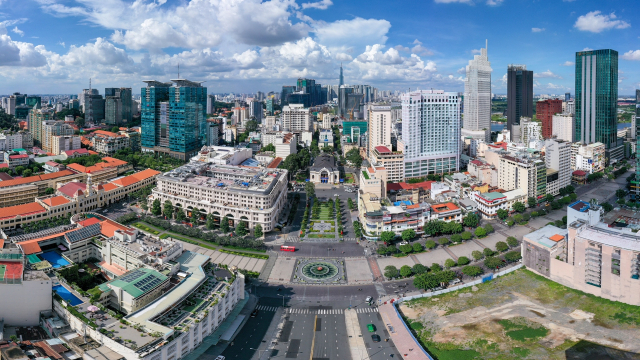Leader Talk
Startups make use of opportunity amid Covid-19
Startups stand to benefit from an environment of the lower doing-business cost during the Covid-19 crisis, including cheap rental and access to talent at lower hiring costs.

The world economy is suffering from the hardest hit and unpredictable changes because of the Covid-19 pandemic. Joblessness is becoming the obsessions of many people around the world. However, during the crisis in the past, there are many success stories of start-up companies that blossoms when the economy comes back to the “new normal” status.
While a series of businesses faced difficulties, even on the edge of bankruptcy, Vietnamese startups like Tiki, OnPoint, Vntrip, or Vietwash still receive millions of USD from foreign investors. Activities among the Vietnamese innovative startup community were also promoted during the Covid-19 season.
Especially, in order to help potential startups to catch the opportunities during this period of time, project NINJA Accelerator sponsored by JICA and powered by NTUitive of Nanyang Technology University (Singapore) is running in Ho Chi Minh City. TheLEADER had an exclusive interview with Lim Boon Chow, deputy director of enterprise development, NTUitive.
There has been a lot of uncertainty in the global economy currently. Do you think it’s a good time to start up?
Lim Boon Chow: Startups stand to benefit from an environment of the lower doing-business cost during the Covid-19 crisis, including cheap rental and access to talent at lower hiring costs.
Moreover, there is no better time for startups to learn to adapt and pivot their businesses, build their capacities to prepare for the eventual economic recovery, allow the well-prepared startups to rebound faster than their peers.
During this uncertain time, startups need to make use of the opportunity to nurture the core competencies of the team, to automate as many processes as possible and the most important thing is building strong relationships with investors, who will stand by you under any circumstances.

The pandemic crisis has put many big startups (i.e. Uber, Airbnb, Yelp, etc.) in turbulence. What makes you so confident that early-stage startups can attract investment and go ahead in this context?
Lim Boon Chow: Investors typically stick to the basic principle in assessing startups, focusing on long term vision.
Early-stage startups that can validate their businesses in response to the Covid situation and define their market and differentiation in tech/product/business model, will still be able to attract investments. Because when the business community is affected seriously, choosing the business to start or already owns may help your business make a breakthrough.
On the order hand, there is no better time to grab market share and benefit from your competitors who failed to survive the crisis. Startups can begin with small volume and limited source, you can take risk during this time and grow faster after the crisis.
In your opinion, what are the challenges that Vietnamese startups are facing and how much could NINJA Accelerator in Ho Chi Minh City help them to get over?
Lim Boon Chow: A few key challenges are the lack of mentorship, finding the right co-founder and team, and understanding the mind of investors to seek funding beyond seed round.
Without the guidance and assistance of mentors, startups spend an average of 18 months figuring out product-market fit for their idea. This results in depletion of resources and failing to take advantage of the wave of current industry trends which are constantly changing.
The loss of time and potential opportunities in finding a market fit for the business can be mitigated with access to the pool of dedicated mentors which consists of industry experts and seasoned entrepreneurs at the NINJA Accelerator in Ho Chi Minh City.
Many of the Vietnamese startups also struggle to find the right founding team and access to funding. Startups are able to gain access to our Partners' network of talents to build the right and trustworthy founding team that can drive the startup forward.
Startups will also learn the frame of mind of investors and hence build rock-solid business plans with access to the network of investors from our partners’ network to accelerate the fundraising process.
Is having a good idea enough for a successful start-up? What else is required?
Lim Boon Chow: A good idea brings you to a good start. However, startups also need other factors such as building the right team with members in their suitable roles and access to talent.
Moreover, accessing key resources such as funding and mentors as well as technology is also the key to build a business moat as a key differentiator. Besides focusing on the main market, startups need to pay attention to bigger markets for expansion.
To become an entrepreneur and pursue your passion, you should possess the business insights, foresight, drive, and strong resilience.
Especially, the ability of understanding and exercising prudence in managing cash flow and capital structure is also a strong differentiator between well-managed and poorly managed startups.
Financially prudent startups will have no problem attracting investment regardless of the economic situation.
As known, Project NINJA was first launched by JICA early this year. Could you please share why JICA came up with this idea?
Lim Boon Chow: The project is launched to help various stakeholders to have potential chances to collaborate and develop entrepreneurialism and identify issues experienced by entrepreneurs as well.
Moreover, this project also implements effective start-up support, promotes collaboration among enterprises in various industries by matching entrepreneurs from developing countries with Japanese companies. We focus on capturing the social impact of startups, promoting investment, and improvement of policy for start-up support in each country.
Why did JICA choose Vietnam to be the first ASEAN country to launch Project NINJA? What is your vision for NINJA Accelerator in Ho Chi Minh City?
Lim Boon Chow: Vietnam’s economy is showing positive signs during this hard time, controlling the Covid-19 successfully gives investors and entrepreneurs more potential opportunities to make their businesses flourish. Data released by the General Statistics Office (GSO) shows a 2.12 per cent growth to Vietnam’s GDP in the first nine months of 2020.
Despite being modest, the rate indicates that Vietnam is one of the few countries that achieved positive growth during the pandemic. With business activities resuming normal operations, Vietnam’s economy is ready to grow up again in the next few years. It’s time for startups in Vietnam to kick off their businesses.
JICA has been active in Vietnam in assisting the country to realize its goal of becoming a modern industrialized country by 2020. Now, JICA is cooperating with Japanese industrial manufacturers, educational organizations, municipalities, NGOs, and others to provide comprehensive assistance for Vietnam's nation-building with a fair society through promoting economic growth, strengthening international competitiveness, supporting vulnerable groups, and enhancing governance.
Why does NINJA project choose those 6 identified UN sustainable development goals (zero hunger; good health & well-being; quality education; affordable & clean energy; industry, innovation & infrastructure; and climate action) as the theme for NINJA Accelerator in Vietnam and not the rest?
Lim Boon Chow: At this moment, these are the goals that the Vietnamese government wants to focus on. They are also our strength because our partners have quality startups that are currently in these six areas.
What are the conditions to register for the NINJA Accelerator in Ho Chi Minh City?
Lim Boon Chow: To be eligible, you should have a project team or a startup of at least two, up to five, members with a near stage idea or a startup solution. All members should have a basic understanding and command of English.
The team can be an early-stage team (pre-incorporation) with only an idea; a pre-seed stage startup working on your Minimal Viable Product (MVP); a foreign startup seeking access to the Vietnamese market; or a spin-off from a local enterprise.
Becoming our candidates, you will need to be physically present in Ho Chi Minh City for the three-month program. The deadline for registration via our website is November 2. The top 60 selected will be announced on November 12, 2020.
Thank you very much!
Nghe An greenlights two FDI projects
Vietnam turns semiconductor vision into action
The global semiconductor industry is being reshaped by geopolitical tensions, shifting supply chains, and the surge of digital technologies.
Cutting red tape in APA approvals to speed up tax negotiations
The change in APA approval authority is expected to shorten processing time and enhance business proactiveness in international tax negotiations.
Enterprise cybersecurity is under threat from the inside
As hybrid cloud systems grow more complex, Vietnamese enterprises are struggling to detect cybersecurity threats moving laterally within their own networks.
Breakthrough for the international financial center ambition
The submission of the draft resolution on Vietnam’s international financial center to the National Assembly heralds a new developmental era for the country.
How leadership philosophy redefines hospitality in Nha Trang
More than just running a 5-star resort, Kristian Petersen is redefining the art of hospitality with a humane and sustainable leadership philosophy.
When organic becomes an inspiring wellbeing lifestyle
For Tyna Huynh, co-founder of Drinkizz, organic is not just a food choice but a way of life that fosters a deep connection between people, nature and community.











































